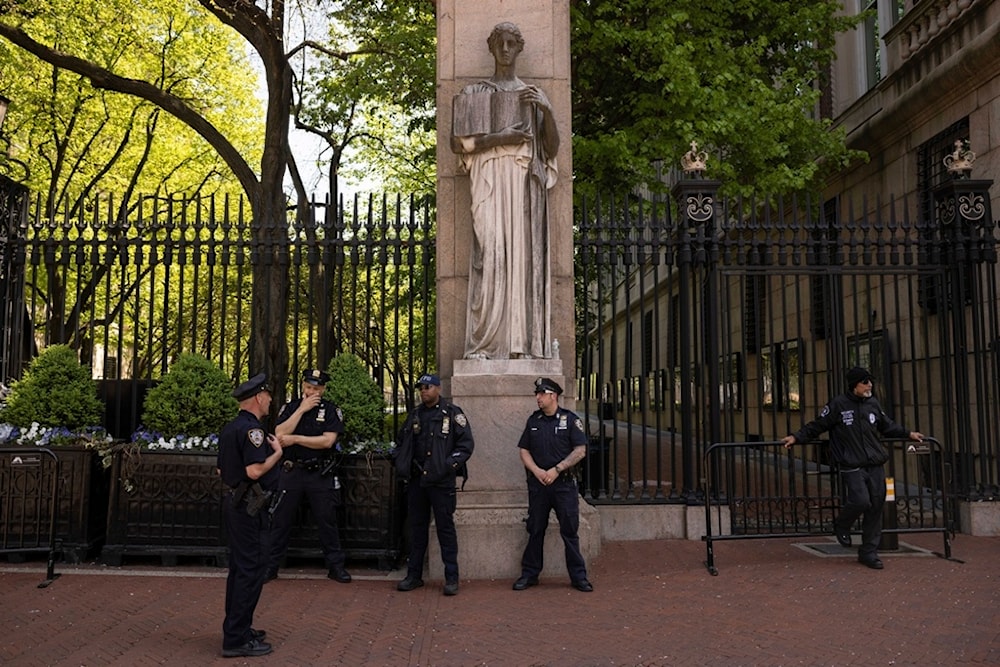Columbia complies with Trump pressures to salvage funding
The University of Columbia has succumbed to US President Donald Trump's pressures as it seeks to salvage its $400 million in funding from being cut off.
-

Police officers stand guard outside Columbia University, on Thursday, May 2, 2024, in New York. (AP)
Columbia University has agreed to several conditions set by the Trump administration after the federal government suspended approximately $400 million in grants and contracts over allegations of antisemitism, according to a university memo released on Friday.
The funding was initially withheld due to what the administration described as Columbia’s failure to address the "persistent harassment of Jewish students." In response, the university has taken steps to meet the administration's demands, including increasing campus security, introducing new protest regulations, and appointing a senior official to oversee departments related to Middle Eastern studies.
The measures include hiring three dozen new campus police officers with arrest powers and requiring individuals wearing face coverings during protests to provide university identification when requested. Additionally, Columbia has appointed a new senior vice provost with authority over the Department of Middle East, South Asian, and African Studies, as well as the Center for Palestine Studies.
'Safe, inclusive' environment
Interim president Katrina Armstrong addressed the changes in a letter to students, stating that Columbia’s response reflects its commitment to ensuring a safe and inclusive environment. She noted that updates on these initiatives were shared with the US Department of Education, the Department of Health and Human Services, and the General Services Administration.
The controversy surrounding Columbia comes amid a broader crackdown on universities by the Trump administration. The university became a focal point of nationwide student protests over the war on Gaza last year and has been under scrutiny for its handling of campus demonstrations.
The administration’s decision to withhold funding followed months of protests, during which Columbia announced disciplinary action against students involved in occupying a campus building.
The university drew further attention after the arrest of protest leader Mahmoud Khalil, a Syrian legal resident, who remains detained by ICE in Louisiana without formal charges.
Control over higher education
The crackdown on Columbia is part of a larger effort by the Trump administration to exert control over higher education institutions.
This week, federal funding to the University of Pennsylvania was paused over its transgender athlete policy, while dozens of universities, including Harvard and Yale, have been warned of potential funding cuts if they fail to address allegations of antisemitic harassment.
The administration has also launched investigations into 45 colleges over alleged “race-exclusionary practices” as part of a broader campaign against diversity, equity, and inclusion (DEI) initiatives. President Trump has also announced plans to shut down the Department of Education entirely.
Columbia’s compliance with these demands underscores the growing pressure on universities to navigate federal scrutiny while balancing campus activism and academic freedom.
For generations, the federal government has allowed colleges to manage their affairs within legal constraints, with the Supreme Court recognizing academic freedom as part of the First Amendment. Higher education leaders argue that this autonomy sets American universities apart and attracts top international scholars.
An aggressive Trump
Trump has long expressed disdain for elite universities and is now aggressively asserting federal control. The government has rarely used its authority to cut funding, but a Trump administration letter sent Monday to 60 colleges warned they could lose financial support if they fail to improve campus safety for Jewish students.
Still, few expected the administration to push for the level of control it is demanding at Columbia.
Academic receivership, a rarely used measure typically applied in cases of financial or political instability, places a department under the oversight of an external administrator.
The letter did not specify who would assume control at Columbia, but Scott, of the AAUP, suggested the department was targeted for its critical stance on "Israel." Meanwhile, university leaders nationwide are alarmed. Mitchell, of the American Council on Education, said college presidents were “aghast” at the administration’s demands.
"It doesn’t matter whether they’re in red states or blue states or whether they’re religious institutions or sectarian institutions. This is not the government’s role,” he said.
Some faculty members and free speech groups condemned the letter.

 4 Min Read
4 Min Read










